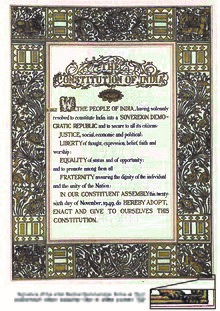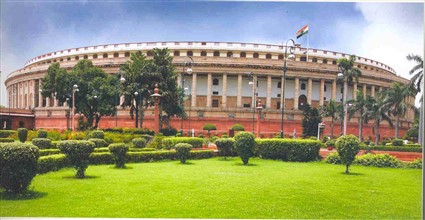“Preamble is the identity card of Constitution of India”

The introduction to the Constitution of India is given by the Preamble. It is a 73 words paragraph which in a gist, describes the Constitution. Each word written in the Preamble have some significance with different parts of the Indian Constitution. It gives a brief idea as to what has been declared in the subsequent Chapters. Though the Preamble is a part of the Constitution but, it cannot be enforced in the Court of Law.
SIGNIFICANCE OF PREAMBLE
Preamble in the initial words gives the source of Constitution which is the “People of India”, the initial wordings of the text is, “We the people of India..”. Further the Preamble declares India as a “Sovereign, Socialist, Secular, Democratic Republic”. It ensures Equality, Justice, Liberty and Fraternity to all the citizens, unity and integrity of the Nation. The date on which the Constitution was adopted is mentioned in this text as 26th November 1949.
Sovereign: The term Sovereign under the Preamble indicates that, India is a free Nation and is independent to decide its internal and external policies without any interference from any foreign Country. As laws of the Country are made by the Parliament, where the bills are initiated under either house of the Parliament, once it is passed in that house it is sent to the other house, which if approved is sent to the President for his consent.
Socialist: It is a concept where the industries are majorly owned and governed by the Government in the Country, but India had adopted the mixed model, where the ownership and control of industries and companies was with Government and also with the private individuals. India also has a concept of public-private partnership. As a fundamental right under Article 19, a citizen can practice any profession, trade, occupation, business.
Secular: Secularism under the Indian concept is, there is no discrimination towards any religion and that all the religions would be treated equally. These provisions are enshrined under the provisions of Articles 25 to 28, where the people are given a choice to practice, propagate the religion of their choice.
Democratic: India is the largest democracy in the world. The leaders in the country are elected by the eligible voters through voting. The Supreme will in electing or rejecting the Government lies with the people of the Nation.
Republic: The Head of the Nation (President in the case of India) is elected through a electoral college consisting of the elected members of both houses of Parliament, State Legislatures and also elected Legislatures of two Union territories of Delhi and Puducherry. The Head is elected by the MPs and MLAs who are elected by the eligible voters.
Unity and integrity of Nation: The Preamble seeks to have a unity in diversity.

IS PREAMBLE A PART OF THE INDIAN CONSTITUTION?
The question of Preamble being a part of Constitution or not has been widely litigated. Some of the cases as decided by the Supreme Court of India are as follows:-
- Re-Berubari Union Case: The Supreme Court has held in this case, that the Preamble is not the part of Indian Constitution. The same was held in Golak Nath v. State of Punjab
- Kesavananda Bharti v. State of Kerala: The Supreme Court had answered the question of Preamble being part of India in affirmation. The Apex Court has held that the Preamble is very much the part of Constitution of India and also it can be amended like any other part, but the amendment cannot change the basic structure of the Constitution.
For the first time, Preamble was amended by 42nd Constitutional Amendment wherein the words, Socialist, Secular and Integrity were added.

By:- Vipul Gaur
